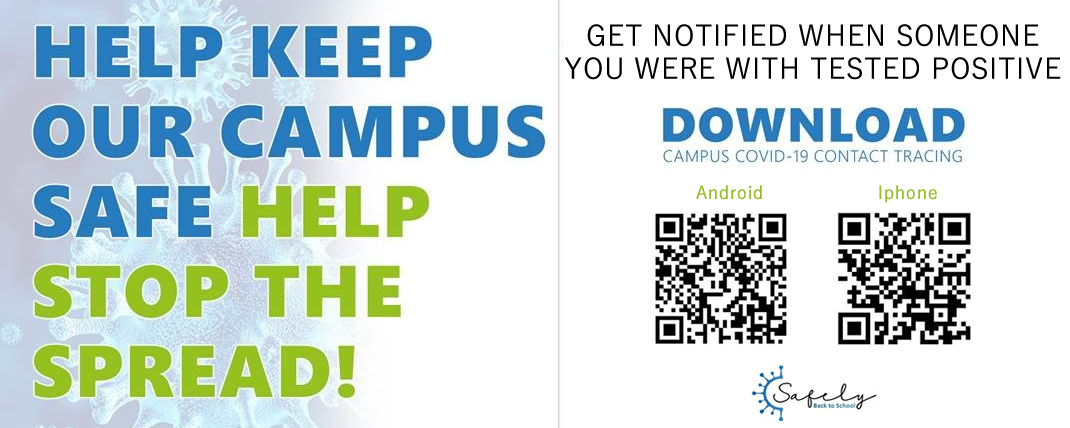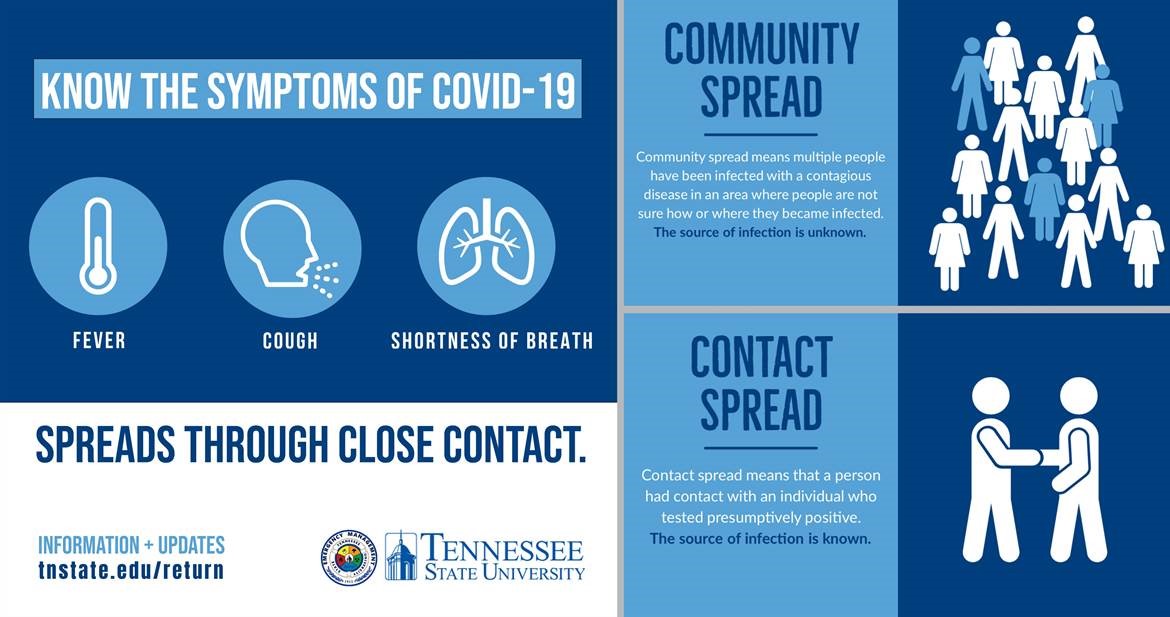Active COVID-19 Cases at TSU
Last two weeks
0 Students
Total Semester Numbers
127 Students
COVID Positive
0 Student
TSU is taking important steps to ensure the health and safety of our students. These include but are not limited to the following:
PERSONAL SAFETY
- Face coverings are required to be worn at all times when in a public place.
- Face coverings distributed to students, faculty, and staff.
- Social distancing precautions are implemented at all times.
- Download COVID19 App (Self-assessment & Contact tracing):
IOS | Android - Students and employees are encouraged to wash their hands throughout the day.
- Students are encouraged to keep their electronic devices in wipeable covers, and to apply disinfectant wipes to their devices often throughout the day.
- Flu shots are strongly recommended for all students.
CLASSROOM SAFETY
- Desk shields available in areas that have been identified as at-risk.
- Classrooms are being assessed to determine the number of students that can occupy the room, based on CDC guidelines.
- Computer labs are being marked to determine the number of persons allowed to use the lab at the same time.
- Appropriate cleaning and disinfecting of desks and high-touch surfaces occur throughout the day for classes, labs, and public areas between usage.
- Technology expanded to provide greater services through utilization of technology.
CAMPUS SAFETY
- Shields installed at service areas throughout the campus to provide a safe communication space.
- Stations located throughout the campus to allow persons to frequently sanitize their hands.
- All buildings are regularly cleaned and sanitized.
- Thorough ongoing cleaning of all campus facilities including residence halls, student apartments, dining halls, and all buildings.
- Social distancing stickers placed throughout the campus to identify the required six-feet distance.
- Shuttle services modified to accommodate the ability to transport fewer passengers.
ON-CAMPUS TESTING
- Self-testing kits are available at the Campus Health Center for all students, faculty and staff.
- If you are experiencing coronavirus symptoms, contact the Campus Health Center at (615) 963-5291 or studenthealthservices@tnstate.edu.
COVID-19 PHONE LINE & E-MAIL
- A non-emergency COVID-19 phone line and email have been established for reporting concerns.
(615) 963-6888 | COVID-19@tnstate.edu


University COVID policy
All students, faculty, staff and other campus community members are asked to wear face coverings while indoors. Social distancing is also stressed. As for vaccinations, the Centers for Disease Control and Prevention has strongly advised and recommended that everyone over age 12 get a COVID-19 vaccination. Tennessee State University advises and recommends the same. TSU does not mandate vaccinations.
We have implemented a multifaceted and integrated plan for COVID-19 surveillance, testing, and early warning. This includes 5 key components that will allow us to reopen and operate the campus, with early identification of virus cases as a critical element to limit outbreaks.
- DAILY MONITORING: We will conduct daily monitoring of temperature and any onset of symptoms by all faculty, staff, and students who enter campus. We also strongly encourage self-monitoring. Additionally, the Office of Emergency Management and the Campus Health Center will implement a system for contact tracing and will include safeguards to protect personal data and privacy. If there are symptoms, diagnostic testing will be required. If the test is positive, consultation with a health care provider and isolation will be mandatory.
- TESTING AT CHECK-IN: Testing is available at the time a student checks into the residence halls. Self-test kits are available for any student, faculty or staff member who request a kit. We will make population surveillance testing to ascertain the baseline infection rate on campus a top priority. Our goal is to make this testing available to all students, faculty, and staff who wish to be tested.
- CONTACT-TRACING: We will continue to work closely with the Tennessee Department of Health for contact tracing. For any positive diagnostic test results, we will operationalize the protocols in place, and will follow the state reporting guidelines. A contact tracing team will be in place to identify potential secondary cases to limit the spread of infection. We have also established our own early contract tracing.
- ENVIRONMENTAL MONITORING: The campus family will be a part of comprehensive environmental monitoring. We are asking all employees to monitor wastewater, air, and high-touch surfaces in campus buildings. This early warning system can help identify areas of concern to help prevent additional outbreaks.
- CAMPUS FAMILY BEHAVIOR: Behavioral changes are vital to ensure the safety and well-being of the campus family. These behavioral changes include wearing a face covering at all times, staying 6 feet apart from others, frequent handwashing, and staying at home when sick.
NEW & ENGAGING CURRICULA
We are working with faculty to enhance and create new and engaging curricula to maximize student learning and development. We are also assisting students in need by offering laptops and technology devices for the fall.
RESIDENTIAL EXPERIENCE & SAFETY
A residential experience is an important component of the collegiate experience. We are working closely with public health experts including the Metro Public Health Department and Tennessee Department of Health for crucial information that will help with the housing plan.
Residential spaces are set aside for isolation and quarantining, if needed. Extensive procedures are also being implemented for the safety and health of Residence Life, housekeeping, and facilities staff.
RESIDENTIAL & CAMPUS LIFE
- MENTAL HEALTH & WELLNESS: The Campus Health Center and the Counseling Center will be open for in-person medical assistance and counseling, as well as online options for support.
- COMMON AREA SPACES: The Floyd-Payne Student Center and other community gathering places will reopen with appropriate health and safety measures in place. Co-curricular programming will emphasize outdoor and virtual activities.
No student athlete, coach, or staff member has been required to get the vaccine for COVID-19. No such mandate has been issued by the NCAA, the Ohio Valley Conference, or Tennessee State University. There are, however, different testing policies for vaccinated and unvaccinated student athletes, coaches, and staff. These policies were developed by the NCAA as the best way to control the spread of the COVID-19 virus. During their competitive season, unvaccinated student athletes will be required to provide three negative antigen tests a week. One of those tests must be within 72 hours of the beginning of competition. Vaccinated student athletes will only be required to test if they become symptomatic. Any positive cases must quarantine following state and local government guidelines. These policies have been taken directly from the NCAA Resocialization of Sport guidelines, which keep Tennessee State University up to date and in compliance with how the NCAA is addressing the COVID-19 pandemic.
For more information, visit Athletics Competition Preparedness Plan





